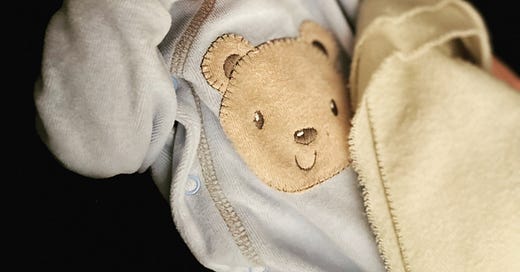In the past weeks, my already-sporadic posting schedule has attained hibernation-like dimensions owing largely to the fact of reproduction. Just 20 days ago, my wife, our daughter, and I welcomed into the world a baby son born on January 28th (an auspicious number) and weighing eight pounds (not bad either). Named Pascal, he was born at the outset of the Year of the Rabbit, making him an Easter bunny. He is a Water Rabbit, as his big sister is a Water Snake, providing another sweet cross-cultural serendipity from both sides of the family tree (de mers). He and his mother are both healthy, and the whole family is very happy and very tired, with the possible exception of a deeply jealous schnauzer.
When Joséphine, my daughter, was born, I was youngish (33) and naive(ish) and so pre-committed to writing an epistolary book of non-fiction about fatherhood with a much older friend, Canada’s first poet laureate George Bowering. I would write George a letter every week (this schedule was aspirational; the spaces between my reports soon grew nearly as quickly as my beautiful child) of the first year of fatherhood, and he would write back, working both from memory as well as from the journals of his own early days as a papa. The book we ended up with was called The Dad Dialogues.
I’ve had cause over the years to be very grateful for that book, mostly because it helped force me to sit down and record some of the details of feeling and experience from a time that would otherwise smear too easily into an undifferentiated exhaustion and confusion, punctuated only by the funniest or hardest moments — “Remember when she was six weeks old and gurgled what sounded exactly like the phrase ‘Oh good God’ from her bassinet?” or “Remember when she was six months old and got chicken pox at the same time the townhouse flooded?”
But I was a maternal orphan experiencing fatherhood for the first time and so it was perhaps more or less inevitable that I was going to pore over the elements of every experience of parenthood in agonizing psychological, if not also political and comedic detail. In the end, the meditations on fatherhood ultimately produced not only the book co-written with George, but to a large extent the one-person show Leftovers co-created with Marcus Youssef, and the Juno-nominated comedy album Fatherland, which was half about fatherhood, half about the rise of fascism (get it? Fatherland? No one else did).
By having our children nine years apart, my wife and I may have taken the James Cameron/Avatar approach to things (wait about a decade between instalments; spend a couple hundred million dollars each time), but it seems unlikely that I will produce any sequels to these works — and not just because people hate anyone’s writing about new fatherhood.
They tell you that you’re usually less anxious when it comes to your second kid, and while I find so far that that’s been true to an extent, the far greater change this time around is that I’m seem to be less self-conscious. This time feels less about deliberately entering a new phase of life, or about setting right the pains and privations and losses of the past. This time there’s a new baby at the centre of everything again, but there’s also a nine-year-old who needs just as much love, a dog who still needs walks, and two that-much-more-jaded parents, now in their forties, at least one of whom has been humbled, if not cowed, by the pandemic-era technological and economic transformations of his various fields of professional endeavour.
But a humbling cuts both ways, and so if I don’t foresee any major, immediately baby-propelled creative output on the horizon just at the moment, I know too much now about life to dismiss the possibility out of hand. In both the Hebrew Bible (or Old Testament) as well as the New Testament, stories about older parents birthing new babies are recurring symbols of faith, or the lack of it. Zechariah, a priest, loses the power of speech when he doubts that his wife Elizabeth can become pregnant with John the Baptist; when God promises a child to Abraham and Sarah, she laughs at the very idea. A new baby, at a time when you thought it was too late in the day to have one, is powerfully symbolic (in that, per Paul Tillich and Sandra M. Schneiders, it not only represents but also embodies or participates in the reality) of the transcendent power of renewal — the eternal conquering of ‘non-being’ by the ‘power of being’ (Tillich).
My first child was born at a time that felt like the beginning of something (a time in life, career, in political history), and making sense of those facts came with a burst of creative energy. But my second child has come at a time — in the wake of pandemic, and of nightmares and failures both public and historical as well as private and personal — when I had thought that the best days, all the days of newness, were behind us. By just by his being here with us, I know now that’s not the case. Maybe that realization, too, will lead to a rush of writing — or maybe the opposite; maybe it will lead to a quiet, the exact inverse of Zechariah’s. One that comes precisely from trusting that there’s still great hope ahead.





beautiful piece of writing, as usual, and congratulations!
This is so touching and highly relatable.